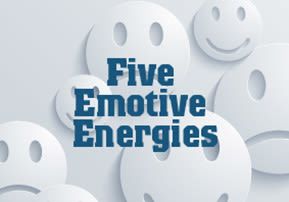
Five Emotive Energies
In this amazing four-part series by renowned Kabbalist and scholar Rabbi Yitzchak Ginsburgh, we learn how the principles of bodily nutrition correspond also to the soul...

Kabbala and Nutrition, Part 3
(Editor’s note: The Italic font face that appears in this series is text that is taken from Biology by Miller and Levine (Prentice Hall), pp. 971-6, a common high school textbook used in the US. Regular text was written by Harav Yitzchak Ginsburgh.)
Water
The most important nutrient is water. Every cell in the human body needs water because many of the body’s processes, including chemical reactions, take place in water. Water makes up the bulk of the blood, lymph, and other body fluids. On hot days, or when you take part in strenuous exercise, sweat glands remove water from your tissues and release it as sweat in the surface of your body. As the water in sweat evaporates, it cools the body. In this way, sweating helps maintain homeostasis. Water vapor is also lost from the body with every breath you exhale and in urine.
Wisdom (water) is referred to as “the point [that is] present uniformly [throughout the entire body].” Every cell in the body needs water.  Water is the source of life; in the Torah, spring waters are called “living waters.” Spiritually, wisdom is the source of life, as in the verse “wisdom gives life,” and so the study of Torah (Divine wisdom) is likened to water. In the words of the sages, “water refers to the Torah.”
Water is the source of life; in the Torah, spring waters are called “living waters.” Spiritually, wisdom is the source of life, as in the verse “wisdom gives life,” and so the study of Torah (Divine wisdom) is likened to water. In the words of the sages, “water refers to the Torah.”
Humans need to drink at least 1 liter of water each day. If enough water is not taken in to replace what is lost, dehydration can result. This condition leads to problems with the circulatory, respiratory and nervous systems. Drinking plenty of clean water is one of the best things you can do to help keep your body healthy.
Carbohydrates
Simple and complex carbohydrates are the main source of energy for the body. The sugars found in fruits, honey, and sugar cane are simple carbohydrates, or monosaccharides and disaccharides. The starches found in grains, potatoes and vegetables are complex carbohydrates, or polysaccharides. Starches are broken down by the digestive system into simple sugars. These molecules are absorbed into the bloodstream and carried to cells throughout the body. Sugars that are not immediately used to supply energy are converted into the complex carbohydrate glycogen, which is stored in the liver and in skeletal muscles.
Many foods contain the complex carbohydrate cellulose that is often called fiber. Although the human digestive system cannot break cellulose, you need fiber in your diet. The bulk supplied by fiber helps muscles to keep food and wastes moving through your digestive and excretory systems. Foods such as whole-grain breads, bran, and many fruits and vegetables are rich in fiber.
As mentioned, the five nutrients (carbohydrates, proteins, fats, vitamins, and minerals) correspond to the source of the five emotive energies inherent in the sefirah of understanding (the mother principle). The five are:
(1) love, (2) fear, and (3) compassion—the three primary emotive energies, and
(4) confidence and (5) sincerity—the two secondary emotive energies.
Let us picture the correspondence between the five nutrients and the five sources of the emotive energies in chart form:
| might (gevurah) proteins | loving-kindness (chessed) carbohydrates |
| beauty (tiferet) fats | |
| acknowledgment (hod) minerals | victory (netzach) vitamins |
Carbohydrates, commonly known as sugars (sweets), correspond to the source of the emotive energy of love inherent in understanding. There are two types of love:
- intellectual love (attraction that is aroused by the intellectual contemplation of an object worthy to love)
- natural love (innate love that arouses naturally, spontaneously and without contemplation).
These two love-types correspond to the simple carbohydrates and the complex carbohydrates:
Intellectual love corresponds to complex carbohydrates.
Natural love corresponds to simple carbohydrates.
Fats
Fats, or lipids, are an important part of a healthy diet. Fats are formed from fatty acids and glycerol. Your body needs certain fatty acids, called essential fatty acids, to produce cell membranes, myelin sheaths, and certain hormones. Fatty acids also help the body absorb fat-soluble vitamins. When a person eats more food than is needed, the body stores the extra energy as fat. Deposits of fat protect body organs and insulate the body.
Based on the structure of their fatty acid chains, fats are classified as saturated or unsaturated. When there are only single bonds between the carbon atoms in the fatty acids, each carbon atom has the maximum number of hydrogen atoms and the fat is said to be saturated. Most saturated fats are solid at room temperature—including butter and other animal fats.
Unsaturated fats have at least one double bond in a fatty acid chain. Unsaturated fats are usually liquid at room temperature. Because many vegetable oils contain more than one double bond, they are called polyunsaturated. Figure 38-4 shows foods that contain both saturated and unsaturated fats.
People often consume more fat than they actually need. The American Heart Association recommends a diet with a maximum of 30 percent of Calories from fat, of which only 10 percent should be from saturated fats. The health consequences of a diet high in fat are serious. They include an increased risk of high blood pressure, heart disease, obesity, and diabetes.
Fats correspond to the source of the emotive energy of compassion inherent in understanding.
In Kabbalah, compassion is referred to as “the [torso of the] body,” which is either fat or slim. In Hebrew, the word for “fat” is cognate to the word for “oil.” Interestingly, because of this, a “fat body” is usually an idiom implying a healthy, or, “well oiled” body. Thus, caring for one’s health is akin to having compassion for one’s body. Still, it is important to note that too much concern for one’s physical health, i.e., too much compassion for the body translates into too much fat! If an individual is not conscious of his or her real purpose in life, over-attention to the body may lead to an obsessive concern for health and result in the very opposite of good health!
Saturated fats are usually solid at room temperature while unsaturated fats are usually liquid. In Kabbalah, saturation relates to the presence of the faculty of knowledge within compassion. Such saturation translates in practice into a keen sense of knowing toward whom one should express compassion and how to express that compassion. The more saturated (meaning, the more knowledge is present in one’s compassion), the more solidified one’s feeling and implementation of compassion.
There is a Kabbalistic model that relates the four most basic atomic elements with the emotive faculties. Let us draw this model in its traditional format:
| fear carbon (C) | love hydrogen (H) |
| compassion oxygen (O) | |
| lowliness nitrogen (N) | |
In Kabbalah, it is the faculty of knowledge (graphically situated just above and between love and fear) that is the source and which binds love and fear. Using this model we can also write the equivalent statement: knowledge is what binds hydrogen and carbon atoms.
Proteins
Proteins have a wide variety of roles in the body. Proteins supply raw material for growth and repair of structures such as skin and muscle. Proteins have regulatory and transport functions. For example, the hormone insulin is a protein that regulates the level of sugar in the blood. Hemoglobin, a protein found in blood, helps the blood transport oxygen.
Proteins are polymers of amino acids. The body is able to synthesize only 12 of the 20 amino acids used to make proteins. The other 8, which are listed in Figure 8-5, are called essential amino acids. Essential amino acids must be obtained from the food that you eat. Meat, fish, eggs, and milk generally contain all 8 essential amino acids. Foods derived from plants, such as grains and beans, do not. People who don’t eat animal products must eat a combination of plant foods, such as beans and rice, to obtain all of the essential amino acids.
Proteins correspond to the source of the emotive energy of fear inherent in understanding.
Somewhat surprisingly, psychologically and spiritually, fear is manifest in the psyche as might. The explanation for this is that a person’s might represents the strength necessary to face his fears and to overcome the object or objects of fear. On the physical plane, in the body, might is manifest as muscular strength, which comes from proteins.
Proteins have regulatory functions. For example, the hormone insulin is a protein that regulates the level of sugar in the blood. In Kabbalah, we are taught that fear also has a regulatory function. Fear regulates love (just as with regard to too much compassion, too much love, or unregulated love, may have negative results).
As noted, proteins are polymers of amino acids. In general, the spiritual psychological equivalents of acids derive from the emotive energy of fear/might in the human psyche.
To be continued…
* * *
Reprinted with courtesy of www.inner. org













Tell us what you think!
Thank you for your comment!
It will be published after approval by the Editor.